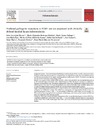Please use this identifier to cite or link to this item:
https://accedacris.ulpgc.es/jspui/handle/10553/58401
| Title: | Predicted pathogenic mutations in STAP1 are not associated with clinically defined familial hypercholesterolemia | Authors: | Lamiquiz-Moneo, Itziar Restrepo-Córdoba, María Alejandra Mateo-Gallego, Rocío Bea, Ana María Alberiche Ruano, Maria Del Pino García-Pavía, Pablo Cenarro, Ana Martín, Cesar Civeira, Fernando Sánchez-Hernández, Rosa María |
UNESCO Clasification: | 320502 Endocrinología | Keywords: | Familial hypercholesterolemia STAP1 Mutation-negative familial hypercholesterolemia Family cosegregation |
Issue Date: | 2020 | Journal: | Atherosclerosis | Abstract: | Background and aims: Autosomal dominant familial hypercholesterolemia (FH) is caused by mutations in LDLR, APOB and PCSK9. Two new putative loci causing FH have been identified recently, the p.(Leu167del) mutation in APOE and new mutations in the signal transducing adaptor family member STAP1. We aimed at investigating the role of STAP1 mutations in the etiology of FH. Methods: We sequenced LDLR, APOB, PCSK9, LDLRAP1, APOE, LIPA and STAP1 with the LipidInCode platform in 400 unrelated subjects from Spain with a clinical diagnosis of FH. All subjects carrying rare predicted pathogenic variants in STAP1 gene, described as pathogenic by at least three bioinformatic analysis and having an allelic frequency lower than 1% in general population, were selected for family study. Available relatives were recruited, including both hypercholesterolemic and non-hypercholesterolemic family members. Results: Sequencing analysis of STAP1 gene revealed seventeen rare variants, four of them being described as pathogenic by bioinformatic analysis. We studied the cosegregation with hypercholesterolemia of four rare predicted pathogenic variants, c.-60A > G, p.(Arg12His), p.(Glu97Asp), p.(Pro176Ser) in seven families. We did not observe any cosegregation between genotype and phenotype, even carriers of rare variants in STAP1 had lower LDL cholesterol levels than non-carriers. Conclusions: This study analyzes the family cosegregation of four rare predicted pathogenic variants of STAP1, p.(Arg12His), p.(Glu97Asp), p.(Pro176Ser) and c.-60A > G, in seven families, showing absence of cosegregation in all of them. These results would suggest that STAP1 gene is not involved in hypercholesterolemia of these families. | URI: | https://accedacris.ulpgc.es/handle/10553/58401 | ISSN: | 0021-9150 | DOI: | 10.1016/j.atherosclerosis.2019.11.025 | Source: | Atherosclerosis [ISSN 0021-9150], v. 292, p. 143-151 |
| Appears in Collections: | Artículos |
SCOPUSTM
Citations
21
checked on Jun 8, 2025
WEB OF SCIENCETM
Citations
17
checked on Mar 30, 2025
Page view(s)
100
checked on Aug 10, 2024
Download(s)
345
checked on Aug 10, 2024
Google ScholarTM
Check
Altmetric
Share
Export metadata
Items in accedaCRIS are protected by copyright, with all rights reserved, unless otherwise indicated.
